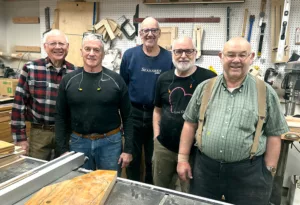
Home » Aerospace work outpaces other sectors at AccraFab
Aerospace work outpaces other sectors at AccraFab
Company puts more focus on industry with new office

June 16, 2016
Long known as a precision sheet metal fabricator, Liberty Lake-based AccraFab Inc. has spent the last few years working to expand its services to include other industries, with a particular focus on aerospace.
AccraFab manufactures parts to serve various industries, including energy and power, medical, communications, test and measurement, coffee equipment, and aerospace.
Company President Greg Konkol says that while most of the company’s work is related to creating precision equipment to support those industries, the sector in which it has seen the most growth is aerospace.
“The work we do is highly precise, requiring exactness and certain cosmetic standards as well,” says Konkol. “That precision makes us a great fit for the aerospace industry, as it is a highly competitive field requiring specialized manufacturing know-ledge.”
Konkol says the aerospace manufacturing portion of the company’s business has experienced a higher rate of growth than any of the company’s other areas, and is projected to continue that trend the rest of this year as well as next year.
“AccraFab has been involved with the aerospace industry for the past decade or so, but we’ve really seen it start to pick up in the last five years,” he says.
In February, the company opened a new Kirkland, Wash., office, designed specifically to support its work within the aerospace sector, hiring director of sales Jean Crawford to manage it, Konkol says.
He says Crawford will be responsible for aerospace-related sales, service, and support, working with internal engineering and customer service resources on product development and program management.
“It’s all about servicing our aerospace customers in the area and continuing to expand our aerospace business,” he says.
The company currently employs 165 people, but Konkol says it hopes to boost that to 185 people by the end of this year.
“At one point, we had 523 people spread out across three locations,” says Konkol. “Following the 2001 telecom crash and the 2008 recession, we downsized. Since that time, the company has been in a rebuilding phase.”
He says AccraFab houses many capabilities under one roof, offering welding, machining, manufacturing, assembly and finishing, engineering, design, and prototyping services. While the company does offer shipping worldwide, the majority of its business is in the Northwest region.
Konkol declines to disclose the company’s revenues, but says its sales are up 8 percent year to date, compared with last year.
He says AccraFab serves about 110 clients, about 20 of which are part of the aerospace industry.
“I would say about 15 percent of all our business is dedicated to aerospace, and looking ahead we expect that area to grow by 12 percent this year,” he says.
Konkol says the aerospace industry is increasingly competitive because it is driven by cost-efficiency pressures related to air travel. Companies such as Boeing Co. and French-based Airbus compete to manufacture new airplanes to sell to airlines.
“In aerospace, companies such as Boeing are what we call OEMS, or original equipment manufacturers,” he says. “They actually make the final product—in this case, airplanes—and sell it to the consumer airlines.”
Konkol says that a tiered supply chain model is common in aerospace as well as other industries where the final product consists of many complex components and subassemblies that must comply with quality, manufacturing, and business standards.
Companies further down in the chain provide aircraft manufacturers such as Boeing with various components that meet different specifications and states of completion.
Manufacturers in Tier 1 supply the OEMS, while they in turn are first supplied by manufacturers in Tier 2. Lower tiers in the chain provide decreasingly finished subassemblies, components or materials, on down to suppliers of raw materials such as steel, glass, rubber, and plastics.
Konkol says that AccraFab is considered a Tier 2 supplier, creating mostly interior airplane components such as seating, overhead lights, galleys, and instrument components and display panels used within the cockpit.
“We don’t manufacture any structural or outside components,” he says. “Occasionally, we’ll do some electrical assembly work, but for the most part, our focus is on creating the mechanical parts of these instruments.”
AccraFab was founded in 1979 by Bob Griffith and Keith Holman in Spokane Valley. Konkol and business partner Don Hemmer purchased the then employee-owned business in 1999, with each taking on the title of CEO in turn and running the day-to-day operations.
The company went on to outgrow several locations before developing its current building at 23201 E. Appleway in Liberty Lake in 2001. Manufacturing and warehouse space take up most of the 155,000-square-foot facility, with 15,000 square feet dedicated to office space.
While manufacturers usually have a general certification of standards, known as ISO, to help achieve targeted cost-effective and quality-assurance criteria, Konkol says AccraFab has pursued higher certifications to help it continue to grow in the aerospace industry.
“In 2012, we were awarded the AS1900 Rev C Certificate of Registration, a standardized quality management system for the aerospace industry,” he says. “It speaks to a higher level of quality and standard of production, and many of our aerospace customers require it.”
Last year AccraFab also was named company of the year by the Aerospace Futures Alliance of Washington, an industry trade group that advocates on behalf of aerospace companies in the state.
AccraFab also has been a member of the Inland Northwest Aerospace Consortium, or INWAC, since 2013. INWAC is a regional organization created to support collaborative relationships between local aerospace manufacturers and service providers. Members are generally regional businesses that provide manufacturing or other services to the aerospace industry.
Konkol joined INWAC’s board of directors in 2014, becoming its chairman last April.
“This year, we paired with the Idaho Aerospace Alliance, IDA, to offer affiliate memberships between the two organizations, meaning we can more easily share information and continue to grow aerospace business throughout the region,” he says.
Konkol says he and IDA’s president Garry Hojan have been working closely to find ways the two organizations can combine resources.
As a result of their collaboration, this year the two organizations decided to combine their annual conferences into one larger conference held last month at the Coeur d’Alene Resort.
“Last year, our annual spring conference was held in Spokane, and had 120 participants,” says Konkol. “This year the combined I-90 Corridor Aerospace Expo had a total of 195 participants, and we were quite pleased with that turnout.”
Latest News Up Close Manufacturing
Related Articles
Related Products




